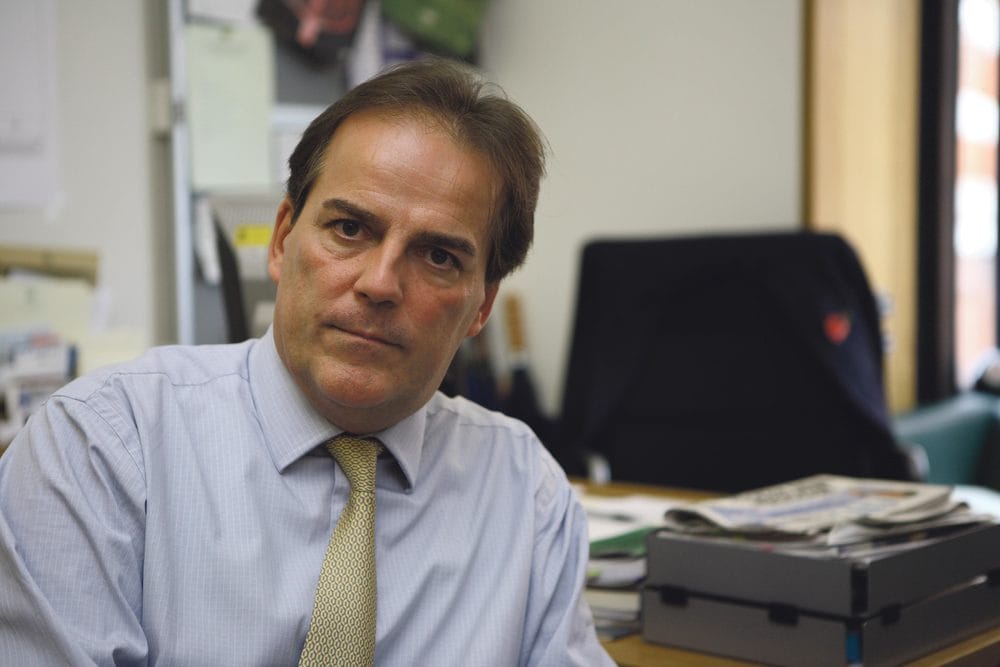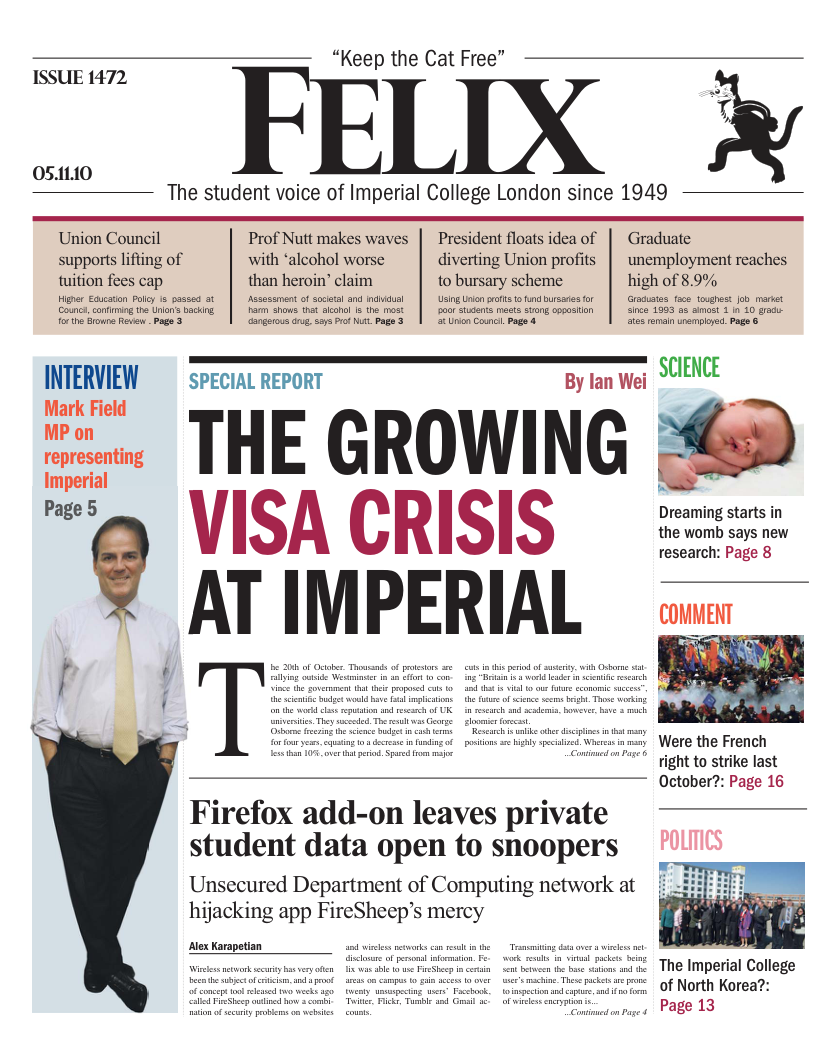"We should be working towards the American system of higher education"
Charles Betts interviews Mark Field MP for the Cities of London and Westminster on science, higher education and representing Imperial

In September, during a speech at Queen Mary University, Vince Cable said “there is no justification for taxpayers’ money to be used to support research that is neither theoretically outstanding nor commercially useful.” What is your stance?
My concern is that with so much of scientific research it is difficult to gauge during the early stages whether the work will be useful. The very nature of scientific research often involves numerous cul-de-sacs before finally utilising some of the experience gleaned from going down those various routes. I don’t think having as hard and fast a rule in place is terribly sensible and I’m afraid it doesn’t reflect the reality of how scientific research is undertaken.
The science budget has been frozen for the next 4 years, which represents a 10% reduction in real terms. Do you agree with this?
There is a broader issue with funding at the moment. Because of the difficulties with the deficit funding, other budgets have taken absolute as well as real cuts. A freeze is rather more generous than it is for other departments going forward. The difficulty with scientific research is that given those financial constraints there is going to be an increasing demand for evidence of success over a much shorter time period. Scientific researchers may end up spending a disproportionate amount of their time on bureaucratic tasks such as filling in forms to get their next grant instead of on scientific work.
The UK represents 1% of the world population, yet produces 8% of all scientific publications. Do you feel we might lose this edge over the coming years following the spending review?
The issue is that when you simply look at the raw statistics – if you start looking for any measure of success, for example the number of column inches in scientific magazines – then you get perverse incentives to do things in a particular way. A lot of what is published is only read by a handful of people and just gathers dust in the library. That’s not in any way to belittle scientific research and we should be proud of our track record, which we should be looking to maintain, but one of the difficulties with highlighting quite a narrow statistic is that some perverse incentives could come into play.
Do you feel you can fully appreciate the nature of scientific research if you don’t have a scientific background?
I’m sure there are many scientists at Imperial who know more about politics than I do about science. Obviously, you have a limitation. What I’d like to think I can provide is some perspective and to be able to broaden the judgement on a range of other issues, other than just the raw scientific research element. Clearly it helps to have a proper scientific background. Equally, we are working within quite strict financial constraints and will be for the rest of this decade and those concerns also have to be addressed.
We are working within quite strict financial constraints and will be for the rest of this decade
You don’t feel it is a problem in terms of representing Imperial College as our local MP?
The trouble is my constituency is a uniquely diverse seat in many ways. It has very wealthy areas and very poor areas, and it is home to the scientific, the artistic, the political and the economic centres of this country. I do my level best to try and have an understanding of it all. But yes, it’s a classic case of being a jack-of-all-trades and a master of none. I try and do a reasonable job in that regard.
The Browne Review has suggested unlimited fees should be allowed. The Universities Minister David Willetts has said that “ unlimited fees are neither sustainable nor sensible.” Vince Cable has said, “unlimited fees is an avenue that is unlikely to be pursued.” Do you think there should be a cap?
I regret the stance that is being taken by Vince Cable and David Willetts. I can understand the politics of the situation, given that every one of the 57 Liberal Democrats MPs were committed to no rise in fees, as to why we have ended up in this state. I would like to see the cap entirely removed. I see our universities as being elite international players and the worry is that, even towards the best universities, there is a level of complacency in respect to their global role.
I would like to see the cap lifted totally, allow the market to determine where fees are
The funding of US universities means that they can attract the best academics to make their careers there. I would like to see the cap lifted totally, allow the market to determine where fees are, have some safeguards to ensure there are bursaries in place and in the meantime try and build up alumni funds as in the US model. The worst of all worlds is if we do have a cap and I am particularly worried about having a lower rate cap which is being suggested at £6000-£9000 – I want to see a diversity of innovative universities. Let’s have 2-year degrees (not at places like Imperial, but other places like private colleges) that cost say £3500/year. Give another option to people rather than have the whole thing hamstrung in a very bureaucratic way. If a cap is too low, one or two universities may go private – you hear about Cambridge and Imperial contemplating that route depending on how negotiations pan out. I support the Browne review. I have had conversations with Richard Sykes in the past and he would note how much you can charge a home grown student and how much you can charge an international student. He rightly takes the view that we want our indigenous British people in our top institutions. Given the enormous gulf between the two fee levels, there is going to be a push to get lots of overseas students. I want to promote a genuine meritocracy.
Do you envisage a system similar to the American one?
`Realistically I think we are heading in that sort of direction. The benefit the American system has is that the private universities have these huge endowment funds and are able to say if you are good enough – not necessarily academically, for instance if you are an elite sportsman – if you can bring something to this institution then, whether your parents earn a modest amount or not, we can make a way of making that work. That’s the sort of model we should aim towards. I appreciate that the American institutions have the benefit of huge alumni funding – to get to that stage will take some time.
In the event of unlimited fees, the wealthiest could pay without problem, and the poorest would be offered scholarships. Is there a chance the middle classes could suffer?
Yes, I think so. It’s a classic debate we’ve been having in the last week about housing benefits. It’s the middle that is being squeezed. I was the first person in my family to go to university. I’m from the middle class. I was very lucky and had a full grant and no debt. I am adverse to debt and can see that is the worry – though I’d probably take it on the chin.








